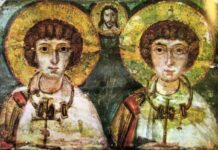The experience of God’s silence (I)
(from the Alphonsian Academy blog)
On March 27, Christians prayed with Pope Francis to ask for an end to this continuing epidemic. The silence of man is always striking, but much more striking is the silence of God; the first can be a problematic attitude, the other always remains a mystery. If God is silent, it means that we must reflect on what he said before. God does not remain silent forever, but acts correctly; in the history of the Chosen People, he has observed silence for certain periods, which have meaning once patience and once reproach.
After the death of Josiah (638-609 B.C.), the pious king of Judah, the new rulers proved unworthy of this call and led the people astray. The demand for repentance and reform was neglected by most of the inhabitants of the country. The crisis required a far-reaching effort.
Jeremiah (626-587 B.C.), who at that time exercised his prophetic ministry under God’s guidance, reminded the Chosen People of his history, beginning with the liberation from slavery in Egypt and the covenant that God had made with the Israelites: “(…) Hear my voice! Then I will be your God, and you will be my people; and walk always on the road which I shall prescribe to you, that you may be happy. But they neither listened nor listened; rather they preceded according to the obstinacy of their evil heart, and instead of turning their faces to me they turned their backs on me” (Jer 7:23-24). Those who heard the speech of Jeremiah understood this reference to the time of Eli, the high priest, the last judge of Israel when the Philistines defeated the Israelites and took the ark of the covenant.
In the First Book of Samuel, we read: “(…) The word of the Lord was rare in those days, visions were not frequent” (1 Sam 3:1). This sentence refers to the spiritual decline of the house of Eli, already condemned by the man of God (1 Sam 2:27-36). The period of Cofni and Pincas, Eli’s two sons, was a period of corruption and malpractice. Their sin consisted in a lack of respect for the sacred liturgical actions they performed as priests and in trampling on gifts brought to God. The lack of respect was an outward manifestation of the lack of love and reverence for God. Their behavior alienated the Israelites from God; their sins related to the offering of sacrifices were directed directly against God and could find no justification. Eli admonished his children, but he did not exert any pressure on them or sanction their behavior. The punishment that struck them consisted in their removal from the priesthood. The priesthood was definitively removed from Eli’s family and given to the family of Sadok (1 Sam 2:35), who exercised it for more than five centuries, from the time of Solomon.
The silence of God was certainly mysterious, but eloquent; before it, Israel felt shaken and committed itself to return to God. The fundamental condition for accepting God’s will and fulfilling it is the desire to listen to it. We cannot look at the action of the Lord God simplistically. God, whom we know in Jesus Christ, does not remove from our lives, as with a magic wand, suffering, sickness, and death, but enters into these painful experiences and remains with us in the time of trial. God’s action cannot be reduced to that of medicine; certainly, but also to stop the pandemic. In the pandemic, God is in the sick, in the dying, in the doctors, in the volunteers, in each one of us, because in each one of us He reveals Himself as Love. He remains in us and with us when, overcoming our selfishness, we go to Him and approach others, out of love for Him, in our time of need.
Fr. Gabriel Witaszek, C.Ss.R.







